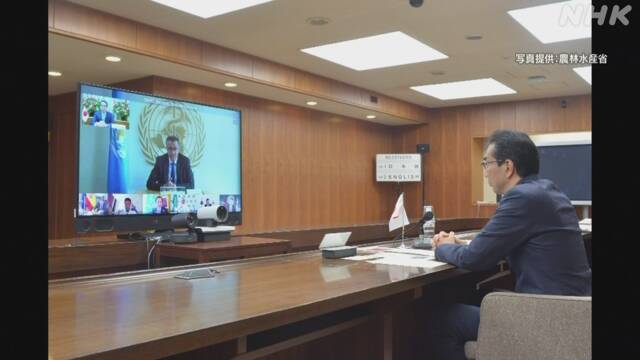Agricultural products export-controlled countries also ... G20 Agriculture Ministers' meeting "Stable food supply" April 22, 6:08
With the spread of the new coronavirus, some countries are moving to restrict agricultural exports. G20 = Ministers in charge of agriculture in the 20 major countries held an extraordinary meeting on the night of 21st, and Minister of Agriculture, Forestry and Fisheries Eto called for not restricting unnecessary import and export.
The G20 extraordinary ministers' meeting was held at a video conference with the participation of international organizations such as FAO (United Nations Food and Agriculture Organization).
The main issue at the conference was how to secure a stable food supply amid the spread of the new coronavirus, and Minister of Agriculture, Forestry and Fisheries Eto said, "To prevent the spread of new coronavirus from affecting food security. It should be done. "
He called for not restricting unnecessary exports and imports, and for all countries to cooperate in order not to stop the flow of production and distribution.
At the meeting after this, we will cooperate closely to maintain a stable food supply, maintain the functions of the food supply chain, and ensure that unreasonable restrictive measures related to imports and exports will not be taken. We have compiled a joint statement that includes things such as caution.
Russia and Ukraine have capped exports to wheat and Vietnam to rice, in order to protect their food supply as the global spread of infection spreads.
According to the Ministry of Agriculture, Forestry and Fisheries, the impact on Japan is limited so far, but the policy is to watch carefully so that the movement to regulate imports and exports does not chain to other countries.
Export control of agricultural products 13 countries in the world
According to the Ministry of Agriculture, Forestry and Fisheries, as of the 20th of this month, there are 13 countries that regulate exports of agricultural products.
Russia, the world's largest exporter of wheat, has set an upper limit of 7 million tons of exports of wheat and barley for three months until June, while the spread of the new coronavirus continues to spread. The annual export limit is set at 20 million tons.
As for rice, Vietnam, which has the third largest export volume in the world, has set an upper limit on exports, and Cambodia has also stopped exporting.
Regarding wheat, Japan imports 88% of its domestic consumption, but imports almost all from the top three countries of the United States, Canada, and Australia, so import regulations have almost no effect.
In addition, we have not had any impact on the price at this time, because we have abundant crops in the last few years and we have enough stock worldwide.
However, if the disruption caused by the new coronavirus continues, export restrictions may spread to other countries, and there is concern that food shortages and rising prices in developing countries may result.

